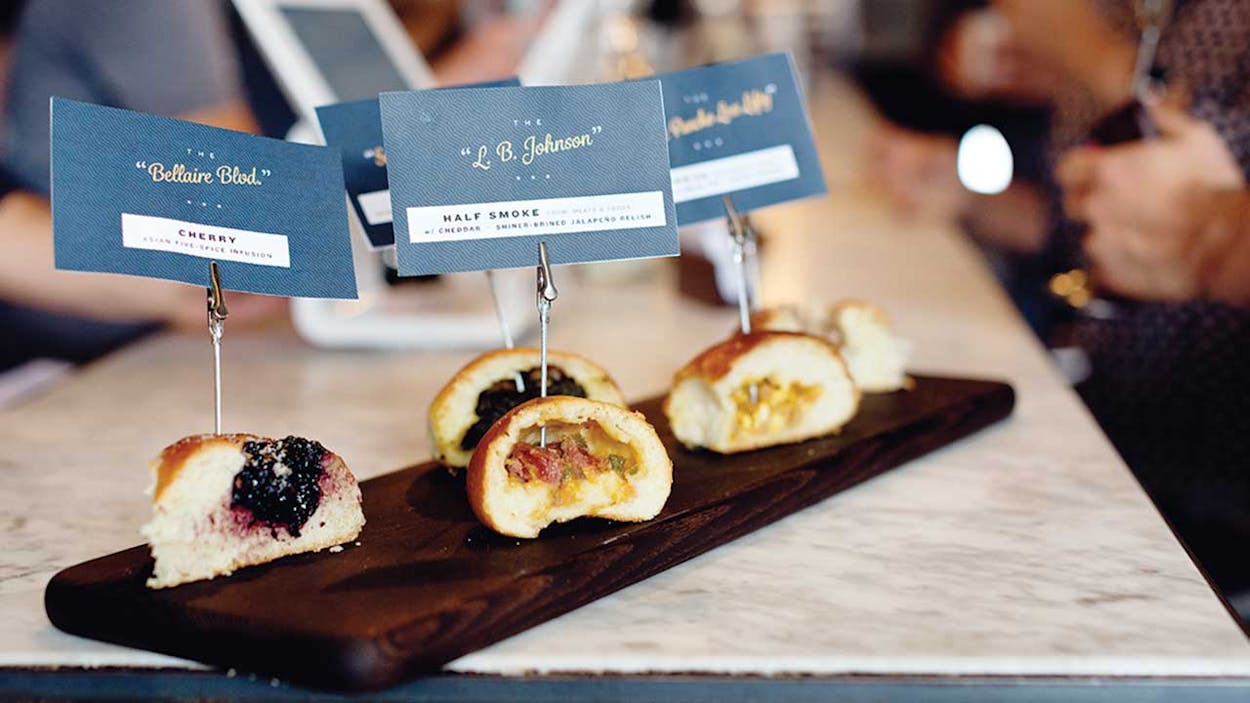At eleven o’clock on a Saturday morning, the line outside American Ice Co., a small bar and restaurant in northwest Washington, D.C., wraps around the building. It’s late August, and, in typical D.C. summer fashion, the heat is unforgiving. Yet hundreds of people, many of them sporting Texas Rangers baseball caps, Texas flag running shorts, and Buc-ee’s T-shirts, have no plans to budge.
The draw for these Texans-in-exile is the grand opening of Republic Kolache, a pop-up restaurant serving the sort of Czech pastries that most of them grew up eating but can’t find in the nation’s capital. As is often the case with opening days, not everything is going according to plan. At 11:45, nearly two hours after the first kolaches were served, Republic Kolache’s co-founder Chris Svetlik emerges to announce that he’s about to run out of food. There are groans of disappointment, but almost nobody leaves. Minutes later, when Svetlik breaks the news that the last kolache has been sold, people finally begin trickling away. A few ask if they can at least buy a Topo Chico.
“This business represents, for a lot of people, a piece of home that they miss,” Svetlik says. He would know; he’s one of them. Svetlik and his business partner, Brian Stanford, grew up in Houston and met a couple of years ago in Washington through mutual friends. Svetlik, who was doing contract branding and design work, and Stanford, then an attorney for the Department of Education, fell into the habit that all out-of-state Texans know so well: reminiscing about home and the things they left behind. Unlike most Texas expats, though, they decided to actually do something about it.
That they settled on launching a kolache restaurant rather than a barbecue or Tex-Mex joint isn’t surprising. Svetlik’s paternal ancestors were Czech immigrants who arrived in Dubina, the first Czech settlement in Texas, in the 1870’s. When he was a child, his grandmother and his father taught him an old family kolache recipe that, with some modifications, he uses as the base for Republic’s kolaches.
“I think my generation is a transitional generation for Texas Czechs,” Svetlik says. “Some of the old traditions are starting to die away, and I think my dad took on the responsibility of making sure his kids kept them alive.”
Stanford doesn’t have that sort of family legacy to draw on; he simply grew up eating kolaches on road trips at places like Weikel’s Bakery, in La Grange. “It was always a treat to stop in these small Czech towns and pick up a dozen kolaches and eat them on the way home,” he says. “It’s definitely a taste memory that sticks with me.”
Last year the two friends began tinkering with recipes in Stanford’s kitchen. Then, this May, when they felt they had the technique down, they launched a Kickstarter campaign (“Help us bring the ‘National Pastry of Texas’ to DC”) to raise $10,000 for the project. Within two weeks they hit $15,471, enough to help them buy kitchenware, packaging, a dough divider and rounder machine, various ingredients, and plenty of Topo Chico. Three months later, Republic Kolache, which is open only on Saturdays, served its first pastry.
On a rainy mid-September Saturday, Republic’s third weekend in business, there’s no line around the block, but the pop-up restaurant is busy. Under umbrellas on the patio, customers ignore the precipitation and gather around cups of hot coffee and trays of kolaches. The filling options are numerous, and at least a couple have likely never been seen in the Lone Star State: vanilla bourbon peach, cream cheese and pecan, cardamom-spiked apricot, egg and chorizo, Tex-Mex saag paneer, and half-smoke sausage, which is made with a classic D.C. sausage that’s similar in consistency to an Elgin sausage but filled with a mixture of pork and beef rather than beef alone.
Stoney Burke, who grew up outside Roscoe, an hour west of Abilene, and works as chief of staff for U.S. representative Will Hurd, is sitting on the patio waiting for a few fellow Aggies to show up. But in the meantime, he’s talking all things Texas with Abigail Rodriguez, a George Washington University sophomore from Cypress. The two have just met, but there’s no shortage of topics to discuss, from their favorite kolache bakery in Texas to the most acceptable barbecue in Washington.
“When I first moved here, eleven years ago, we didn’t have any Texas-style food,” Burke says between bites of kolache. “Now we have things like Hill Country Barbecue, DCity Smokehouse, and now this.”
“I could eat fifty-five of these!” Burke’s friend Conner Prochaska proclaims as he sits down and takes his first bite of a half-smoke kolache. When Rodriguez mentions that she hasn’t tried that flavor, he hands over one of the half dozen he’s ordered without missing a beat. Everyone at the table agrees, heretically, that Svetlik and Stanford’s kolaches are just as good, if not better, than the ones they remember from home.
At another table, Daniel Bleiberg, a University of Texas law school graduate who recently moved to town for a job, is reading Eudora Welty’s Thirteen Stories over coffee. He didn’t expect to miss anything about Texas when he got here, but he soon realized he was wrong. “This fills an important void in D.C. cuisine,” he says, before taking a sip of coffee from a mug that reads “Rise and Shine, It’s Kolache Time.”
Though the space is swarming with Texans, Svetlik and Stanford don’t want to just preach to the kolache choir; as happy as they are to comfort fellow Texans afflicted with a dose of homesickness, they’re evangelists too, hoping to convert people who wouldn’t know West, Texas, from West Texas.
“This is a food we grew up with, but we think it potentially has very broad appeal,” Svetlik says. “It follows the time-honored tradition of dough with good stuff in it. It’s not hard to find new fans.”
- More About:
- Business







